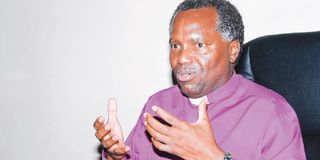THE SOJOURNER: Nostalgically reminded of golden years at Mkwawa High School

Full Gospel Bible Fellowship (FGBF) Bishop Zacharia Kakobe speaks at past event. PHOTO | FILE
It is thanks to Masoud Masoud’s TBC”s ‘zilipendwa’ – oldies – music programme, two weeks or so ago and this last weekend, that I have all of a sudden been receiving many calls and messages from all over Bongoland in regard to my active participation in the early 70s in the then Iringa-based Orchestra Mkwawa Jazz Band. They all wonder how this was possible.
To be more precise, I was one of the band leaders of the pioneer outfit, and its sister soul music band, the Midnight Movers, in that scenic town in Heheland.
Masoud, and this is not the first time he has done so, has always broadcast some of the numbers this band, composed solely of students of the then Mkwawa High School, had managed to compose while successfully pursuing secondary and high school education. The band would on Saturdays and Sundays belt soul music numbers of the likes of then James Brown and Ottis Redding, in the afternoon for the mostly student youth of Iringa, and its original numbers and several rumba music for the elders in the evenings at the then popular Kitanzini Community Centre.
Our enlightened school management encouraged us to pursue these artistic indulgences with the goal of building strong well rounded characters – the ‘total men’ of the future of then Nyerere’s Bongoland. To be more precise we even had a designated school teacher to supervise our programmes. He was our de-facto manager who, among others, scheduled our gigs.
This policy worked and motivated us. Almost all of us went on to join university. I ended up a scribe, some of my colleagues, Sewando, Matola and Manji became engineers, Massanja, (now the late), an airline pilot, also the late Mukama and Hiza became academicians in Canada and Australia respectively. The late Lusekelo, the famous scribe, and Ngororo, an insurer, were our drummer boys, not forgetting one who became a Bishop, Kakobe (picutred).
No wonder this development has always fascinated Masoud and he has always found time to slot in this unique student experience in his programmes, perhaps with the intention of inspiring today’s young Bongolanders and enlightening their mentors on this healthy experience.
But then Mkwawa was a very progressive school. It had clubs on many aspects of life and professions including those on music – guitars, piano, trumpets, saxophones etc; photography – with its own cameras and dark room to process pictures; hikers – with their own hiking gear of boots and the like; agricultural – with their own vegetable plots, seedlings, fertilizers and the like; drama – with their own costumes and directors; traditional dancing – with its drums, costumes and accessories, and many others including the normal boy scout thing. And one was free to belong to one or several of these clubs.
This was apart from the several sporting activities which included the popular football, with three pitches; flood lit volleyball and lawn tennis grounds; cricket, rugby, badminton, hockey, fencing, basketball, table tennis facilities; and gymnastics with the requisite horse.
I for one was more into music, drama and field hockey. Actually apart from playing guitar and singing with the Mkwawa Band I also sang in the school Evangelical Lutheran Church choir. I was also an active member of the then South African – inspired, Jive and Crooning groups – the Skylarks, the Tanzania Students Christian Fellowship (TSCF), and the Usanifu Wa Kiswahili (UKI) Crooners. We used to perform in several places in and around Iringa and even Mbeya. That was indeed a very active secondary and high school life. But over and above all these activities formal classroom education was paramount and stress – free. No wonder when I joined the University of Dar es Salaam in the mid-70s, almost half of the first year students, like in all other years, were from the famous Mkwawa High School.
This was, first, on account of its large high school intake, and secondly its stress-free and exciting high school life which made our young brains brainier.
I therefore thank Masoud Masoud for nostalgically reminding me of these nascent and golden years. How I wish I, or my offspring, could re-live them. Looking at the present nature of our education I do not see how.
The author is a veteran journalist and communication expert based in Arusha




